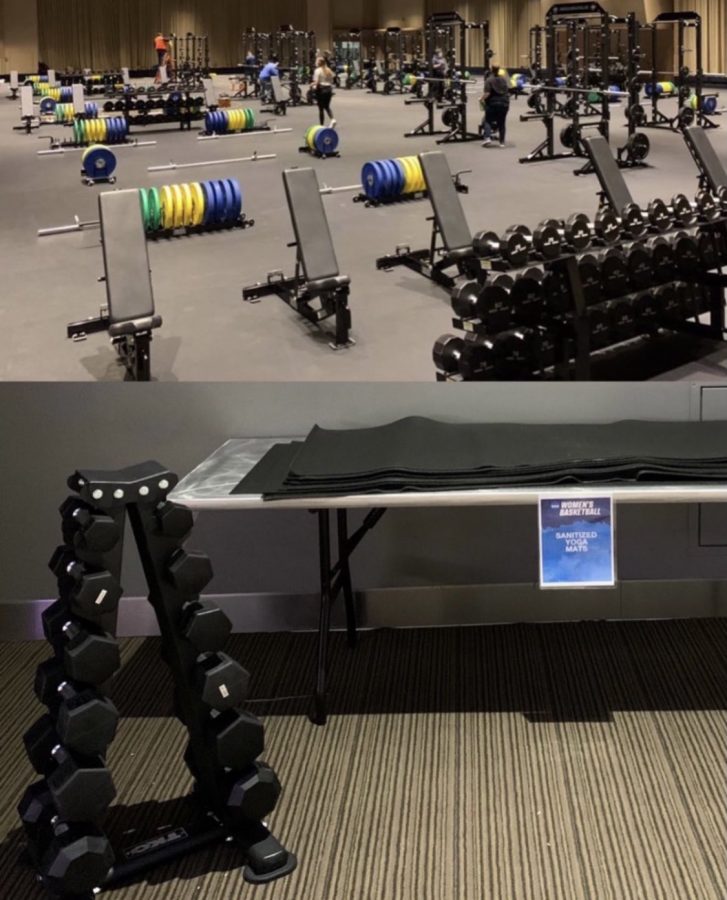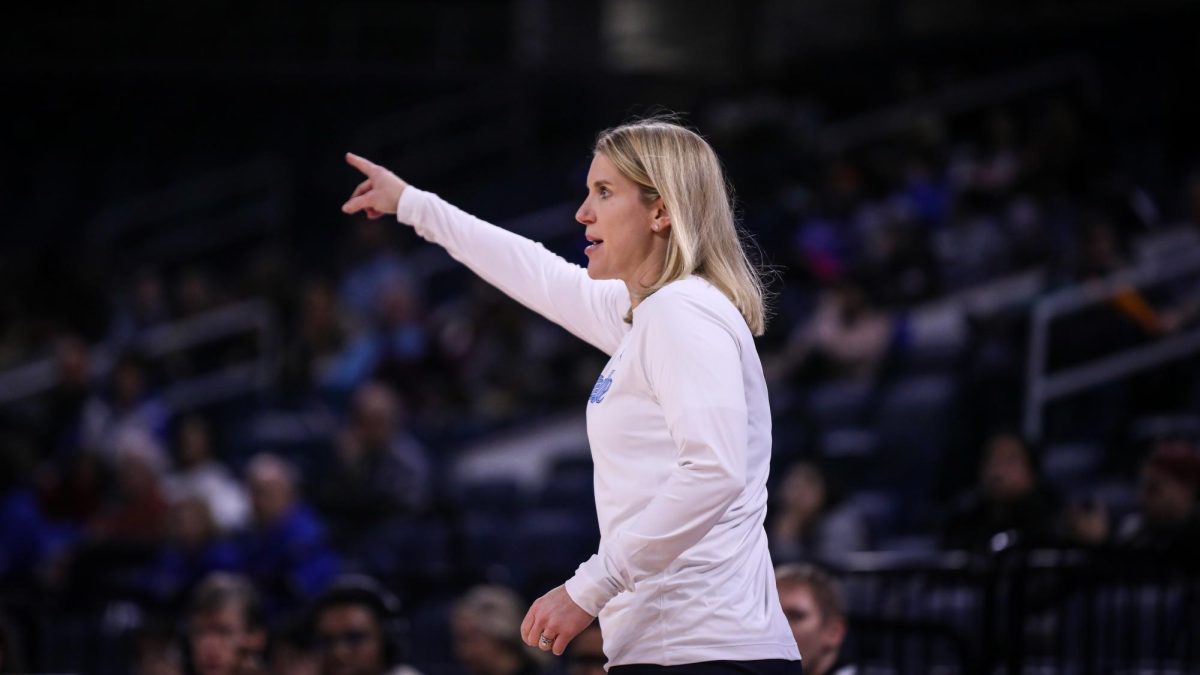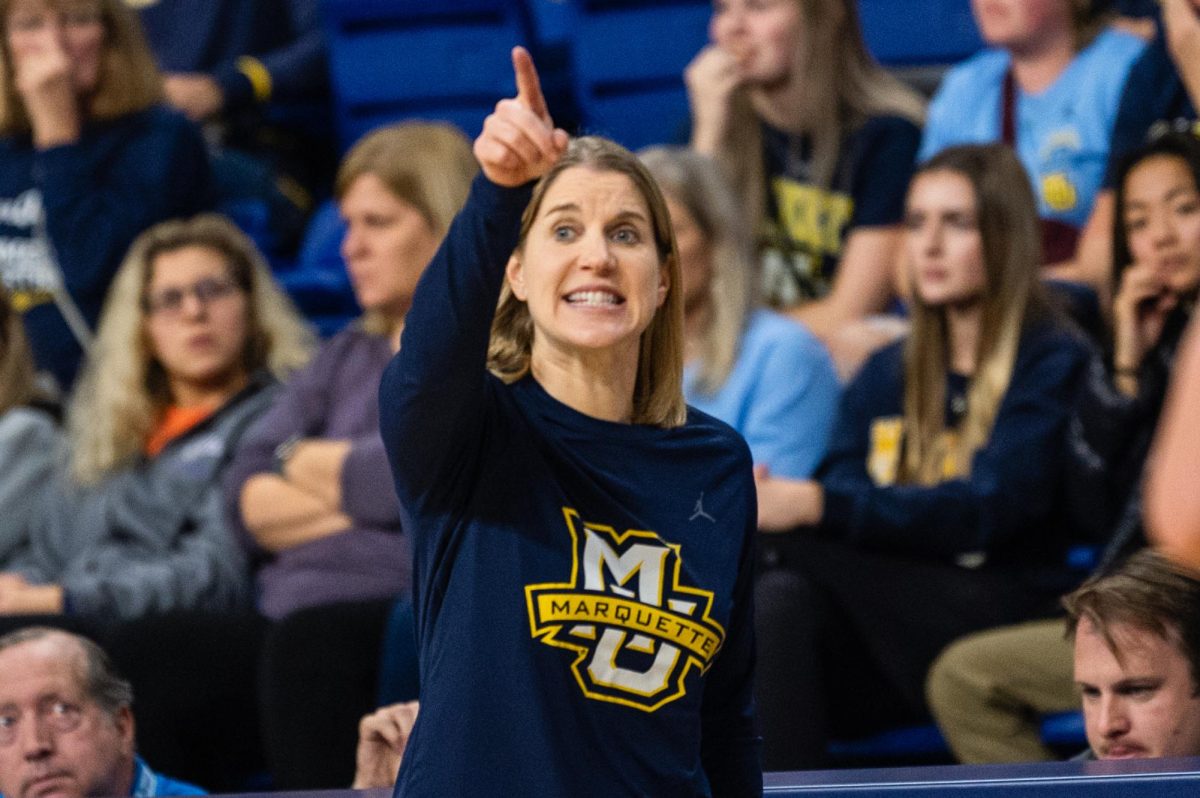It all started with a TikTok posted to Twitter March 18 by University of Oregon redshirt sophomore forward Sedona Prince.
Within a matter of hours, the women’s basketball player’s 60-second video had gone viral with over 8.4 million views. Once it found its way to Twitter, it amassed over 9,600 comments, 24,400 quote tweets, 189,000 retweets and 620,000 likes as of March 22.
In the TikTok, Prince showed the disparity between the men’s and women’s weight room in the NCAA bubbles.
It did not stop there.
Portland’s KION News sports reporter and anchor AJ McCord added to the conversation with photos depicting differences in food and swag bags the men’s and women’s players received. On top of that, a New York Times article exposed how the women received less accurate COVID-19 tests than the men. While the men received polymerase chain reaction tests, the women had rapid antigen tests.
According to Memorial Healthcare, the differences between these two tests are efficiency and time of when the results come back.
The TikTok, along with other tweets of the disparities, have also caught the attention of thousands of famous athletes, media members and celebrities, including the NBA’s Stephen Curry and Kyrie Irving, tennis legend Billie Jean King, legendary former Notre Dame head coach Muffet McGraw, WNBA star Sue Bird and ESPN’s Jay Bilas.
Though she didn’t see all about Prince’s video, Marquette women’s head coach Megan Duffy said it was awesome to see players in the NBA step-up from tweeting to wearing shirts to speaking publicly.
“It’s more than just putting it on social media,” Duffy said March 19 on a Zoom press conference. “It’s really digging into the conversation, the resources and getting the right people at the table continually to try and not brush things under the rug. Just keep bringing it to light and hope we can keep moving forward.”
Similarly to her head coach, Marquette redshirt senior forward Lauren Van Kleunen acknowledged this example of inequality would not have been seen without social media.
“I guess it wouldn’t have been really brought up unless it was like everything else nowadays: videotaped and put on social media,” Van Kleunen said March 19 on a Zoom press conference. “So, I mean, it was a little shocking to see.”
Lynn Holzman, the NCAA vice president of women’s basketball, said March 19 on a Zoom press conference that these concerns were first brought to their attention through social media.
“As that began to unfold, we immediately turned to trying to gather the teams within a span of a couple of hours, the head coaches and the lead administrators, so that we could hear what else was going on or what their concerns were,” Holzman said.
NCAA Senior Vice President of Basketball Dave Gavitt hopped on the March 19 women’s basketball Zoom to admit they “dropped the ball” after the NCAA was called out for the inequities.
“My role at the NCAA is to oversee and coordinate basketball championships and all things with the game. We have intentionally organized basketball under one umbrella with a goal of consistency and collaboration,” Gavitt said. “When we fall short of these expectations, that’s on me as well as our better and outstanding team in both men’s and women’s basketball but under my direction, in my leadership. That’s on me.”
Gavitt mentioned he hopes to use this situation to improve internally — better communicate, better collaborate — for the better well-being of both men’s and women’s basketball.
Another area of discrepancy was the so called “swag bags” that teams received upon arrived to their respective bubble locations for the championships.
As captured in photos, the men’s players received several large towels, shirts, a hat, toiletry products, a book written by legendary Georgetown men’s basketball head coach John Thompson, among many other items. Meanwhile the women’s welcome bag included a towel, Powerade water bottles, a shirt, an umbrella and some toiletry items.
Holzman said both the men’s and women’s basketball staffs work on creating the swag bags and some of those differences had to do with the geographical differences of Indianapolis and Texas, the two states where the championships are held.
“When we heard those concerns, we did a side-by-side comparison of some of the, as referred to, ‘swag bag,'” Holzman said. “We do proactively, with the men’s basketball staff, work together when putting together those student-athlete gift bags. There are some different, some minor differences to that and those are because of things we identified that were more differences relative to the location that we were in.”
Holzman did not explicitly say why the different locations would affect the swag bags.
Along with the unequal balance of items in the swag bags, there is a difference in branding for both tournaments. The men’s tournament is branded as “The Big Dance” with the account name @marchmadness, while the women’s tournament is branded as “NCAA Women’s Basketball.”
“We try to strike this delicate balance between being all the same and yet having some independence so that there’s this unique nature of these championships and the sports,” Gavitt said. “We also have some challenges in that we have different, equally valued, greatly valued, broadcast partners. ESPN for the women’s championship and CBS and Turner for the men’s championship, so branding around broadcast is an issue for those partners as well as for the two championships.”
University of South Carolina’s women’s basketball head coach Dawn Staley released a statement on Twitter Friday, addressing the inequalities. She described it as being “disheartening that we are addressing the glaring deficiencies and inequities in the WOMEN’S and men’s NCAA Tournament experiences for the student-athletes, but here we are.”
But 2021 is not the first time gender inequalities have been recognized as a problem in sports.
In 2015, The Atlantic released an article about how women in collegiate sports felt “marginalized and undervalued,” which indicated this is part of a larger systemic problem.
Meanwhile, a 2020 article in Power Plays Newsletter by Jessica Price, a freelance reporter who has written for ESPN, Teen Vogue and Team USA, addressed how COVID-19 has brought to attention systemic sexism in college sports. Price found a Women’s Sports Foundation report that found there has been a decrease in NCAA female coaches from 90% in 1971 to 43% in 2020. That same report also stated “there are over 62,000 fewer opportunities available for women to play in college, and 87% of schools still offer more opportunities to men relative to the school’s enrollment, falling short of Title IX compliance.”
An Insider article released March 20 pointed out there are 68 men’s teams and only 64 women’s teams in the NCAA Tournament.
These are just some examples of Title IX violations. Title IX is a part of the 1972 Education Amendments Act, which was created to counter sexism and ensure “no person in the United States shall, on the basis of sex, be excluded from participation in, be denied the benefits of, or be subjected to discrimination under any education program or activity receiving Federal financial assistance.”
The NCAA states on its website the three basic parts of Title IX that relate to collegiate athletics are through participation, scholarships and other benefits. Under the “other benefits” category, the NCAA lists equal treatment relating to — and not limited to — equipment and supplies, travel and daily allowance, training facilities and services, housing and dining facilities and services as well as publicity and promotion.
University of Connecticut women’s basketball head coach Geno Auriemma said the occurrences seen in San Antonio are disappointing.
“That is a small sample of what occurs every single day on every college campus across this country,” Auriemma said. “A lot of coaches in women’s sports are successful and doing an incredible job and are doing it with the resources that you would say are less than adequate to what the men might have.”
As a former Division I student-athlete at Notre Dame and WNBA player, Duffy said the overall theme of creating opportunities has gotten better, but there is more to be done.
Duffy said women in sports have always been a group that are both appreciative of and humbled by opportunities. That includes a feeling of thankfulness for the NCAA Tournament happening this year after COVID-19 took it away last year.
“However, there are inequities and we’re seeing it blasted on social media,” Duffy said. “We’re trying to use our voices in the appropriate way to make it clear that we’re not happy with some of the things that are happening but at the same time we still have perspective of how thankful we are.”
In 2020, despite 168 varsity sports across the 10 schools, the BIG EAST had a total of 36 female head coaches, but all of them were in women’s sports.
For Marquette specifically, women’s basketball has been underappreciated in, for example, where the two teams play.
The men’s team plays at the same arena as the Milwaukee Bucks, Fiserv Forum, which holds a capacity of close to 17,400 in non-COVID times. The women’s team plays on campus at the Al McGuire Center, with a capacity of around 3,700.
Holzman said these examples of inequality seen in San Antonio have touched nerves and created more conversations among administrators, coaches and players.
“I have lived in this world. I said I was a women’s basketball student-athlete, although (I was one) back in the early 90s,” Holzman said. “I’ve experienced when you don’t have something that’s the same. This is also why it hits such a nerve with me.”
Nina King, chair of the women’s basketball committee, said “the committee expects an elite championship experience for our student athletes” and added that the conversations need to be pushed further.
“We are charged with providing that to the NCAA staff to ensure that we’re hosting, in this moment, an equitable championship,” King said. “I think the coaches recognized that, in our conversation last night, we are all committed to continuing to push the envelope so that we get this right for our student-athletes, our student-athletes deserve it.”
These conversations continue to happen regularly within the Marquette women’s basketball program.
Duffy said the Golden Eagles have had conversations on topics from social injustice issues to women’s equality, to most recently, what has happened down in Atlanta with the Asian community.
The 2019-20 BIG EAST Coach of the Year further mentioned MU has done a great job showing you can compartmentalize both being a part of this equality fight and focusing on winning a basketball game.
“That’s the awesome thing of our ability to multitask,” Duffy said. “We can use our voices in the right way and the right platform but still be focused on winning as many games as we can in the NCAA Tournament.”
Holzman mentioned it hurts that the confusion and outrage behind the inequalities are felt among fans and teams, as it is the NCAA’s responsibility “to give them a great championship experience and one they can be proud of.”
“It’s disappointing, it is,” Holzman said. “I don’t even have the words to describe how painful it is, personally.”
Despite the discrepancy and inequality, Holzman said there are areas of growth and positivity in San Antonio. Unlike past years, where games were televised regionally, all NCAA women’s games will be nationally broadcasted on the ESPN networks.
“Being nationally broadcasted means that a viewer, starting this year, for the first time, is going to be able to just change the channel on the ESPN networks and be able to see the game. That is representative of the growth of our game overall, not just collegiate women’s basketball,” Holzman said. ” For the first time this year, as well, ABC is going to be broadcasting six of our games. So again, although this is a blemish, I do want to emphasize we have made some strides.”
Staley, the head coach at the University of South Carolina, was critical of these inequities being a larger problem within the institution that has not been solved by NCAA President Mark Emmert.
“The real issue is not the weights or the ‘swag’ bags; it’s that they did not think or do not think that the women’s players ‘deserve’ the same amenities of the men,” Staley said in a statement. “What we now know is the NCAA’s season long messaging about ‘togetherness’ and ‘equality’ was about the convenience and a soundbite for the moment created after the murder of George Floyd.”
On the March 20 edition of ESPN’s College Gameday, Bilas, an analyst on the show, spoke further on the issue.
The former Duke men’s basketball standout blasted Emmert for his leadership after Emmert waited over 24 hours to make a comment instead of coming forth right away on the matter.
“The NCAA men’s and women’s tournament are all under the same umbrella and whatever was ordered for the men and was there for the men should have been there for the women, that seems beyond reasonable discussion,” Bilas said. “It’s a shocking failure in leadership and there you can understand why we have these systemic issues. This is not the first time, let’s just hope it’s the last.”
Along with Bilas, Staley and many other women’s basketball head coaches, Stanford’s head coach Tara VanDerveer posted a statement to Twitter March 20 condemning the NCAA for “blatant sexism.”
“This is purposeful and hurtful. I feel betrayed by the NCAA,” Vanderveer said. “This cannot continue to be business as usual. … This is wrong and unacceptable. So much effort from so many people has gone into making this tournament happen. If it is worth doing at all, it is worth doing right. Let’s fix this once and for all.”
This story was written by Zoe Comerford and John Leuzzi. They can be reached at isabel.comerford@marquette.edu and john.leuzzi@marquette.edu or on Twitter @zoe_comerford and @JohnLeuzziMU.




